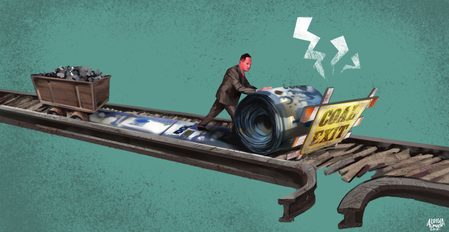SUMMARY
This is AI generated summarization, which may have errors. For context, always refer to the full article.

MANILA, Philippines – Despite pledges to reduce coal exposure, Philippine banks financed $867.08 million (P48.97 billion) worth of coal and fossil fuel projects from the period of April 2022 to March 2023, according to a new report released on Tuesday, April 18.
“The remarkable shift from loans to bonds is what facilitates continued fossil fuel investments,” Avril de Torres, deputy executive director of think tank Center for Energy, Ecology, and Development (CEED), said on Tuesday during the release of Withdraw from Coal: End Fossil Fuels’ (WFC-EFF) annual coal divestment scorecard.
“Banks must realize that every time they underwrite or facilitate a toxic bond, they have a direct hand in the worsening impacts of the climate crisis,” she added.
The report deemed the Bank of the Philippine Islands (BPI) to be the “dirtiest bank” in the Philippines, with the BDO Unibank in second place, climbing up from ranking third in 2022.
Here are the top 10 banks financing coal projects in the Philippines, according to the report. De Torres said the first six banks were the same ones that occupied the top 6 in the 2022 report.
- Bank of the Philippine Islands
- BDO Unibank
- Metrobank
- Security Bank
- Philippine National Bank
- China Banking Corporation
- Rizal Commercial Banking Corporation
- Land Bank of the Philippines
- Development Bank of the Philippines
- Asia United Bank
Established in 2020, the WFC-EFF is a coalition of green organizations, think tanks, and religious groups, including CEED, Living Laudato Si’, Catholic Bishops’ Conference of the Philippines, WWF Philippines, and Manila Observatory.
Financial institutions were critiqued by the coalition based on loans and underwriting issued for fossil gas exploration and production, transport, the conversion of liquified natural gas or LNG to natural gas in order to be utilized as fuel and power, and the construction of fossil gas-fired power plants.
Banks’ spending on coal was contrasted with their divestment policies to calculate their final score.
Following the report’s release, BPI chief sustainability officer Eric Luchangco reiterated the bank’s divestment policies established back in 2021. In a text message to Rappler, Luchangco said BPI “remains on track” toward its target to halve coal exposure by 2026 and achieve net zero by 2032.
Meanwhile, BDO pledged to halve coal exposure by 2033.
Scientists, advocates, and world leaders around the world have been sounding the alarm on the pressing need to limit carbon emissions to 1.5 degrees Celsius. A huge part of limiting emissions is phasing out fossil fuel projects.
The United Nations’ (UN) Intergovernmental Panel on Climate Change has warned that the window to reverse climate change is “rapidly closing.”
What’s stopping banks from phasing out coal?
The WFC-EFF report also revealed government banks – the Land Bank of the Philippines and Development Bank of the Philippines (DBP) – were leading in divestment and sustainability policies.
As of March 2022, Land Bank has approved a total of P20.1 billion ($355.91 million) in loans to support local renewable energy projects.
DBP’s Financing Utilities for Sustainable Energy Development (FUSED) Program in 2022 offered loans to increase access to electricity. It has approved 92 loans so far, of which only 27 were renewable energy projects.
However, support for renewable projects is still negated by financial institutions’ continuing financing of dirty energy. A report published by the Philippine Center of Investigative Journalism last March said risk was a huge factor in banks’ commitment to the industry.
Aside from risk, contractual obligations were also cited as another impediment to banks’ refusal to disengage. Torres, however, reminded banks that their responsibility is not only with corporations they entered contracts into but also with customers and shareholders.
“In our scoring we don’t only look into already existing transactions but the new ones. The new ones, they can opt not to enter [into] these transactions, but they [still] do,” Torres said.
“Reassessing financial mechanisms is not really unheard of…. If banks are going to look at the legal perspective, they shouldn’t only see contractual obligations…. There are other legal repercussions that banks should consider,” she said in a mix of English and Filipino.
While the scorecard doesn’t have enforceability, groups are hopeful that the evaluation would raise awareness among not only banks but also customers and shareholders.
Torres said that in the long term, reports like this – and the public pressure that would result – could pose opportunities for financial institutions to phase out coal.
“This is happening in other parts of the world,” said Torres, citing initiatives like the Net-Zero Banking Alliance convened by the UN.
“It is never too late for banks to reinvent radically and urgently to provide hope to humanity in our battle against the climate crisis,” added Jing Henderson of Caritas Philippines. – Rappler.com
$1 = P56.47
Add a comment
How does this make you feel?

![[OPINION] Do’s and don’ts: Next steps for divesting from dirty energy](https://www.rappler.com/tachyon/2022/01/divesting-dirt-energy-january-22-2022.jpg?fit=449%2C449)










There are no comments yet. Add your comment to start the conversation.